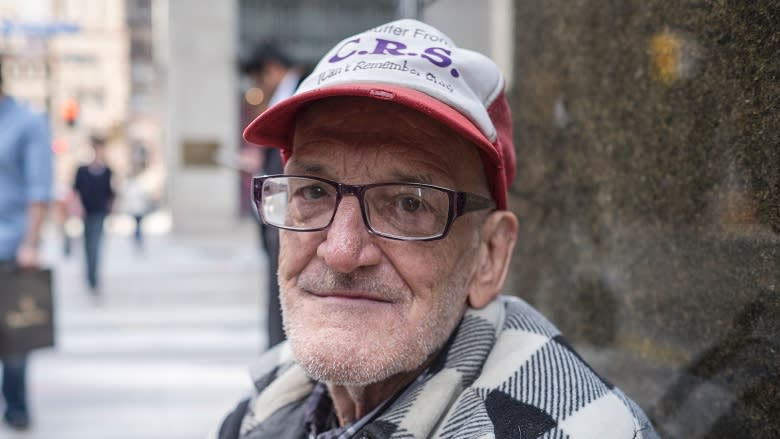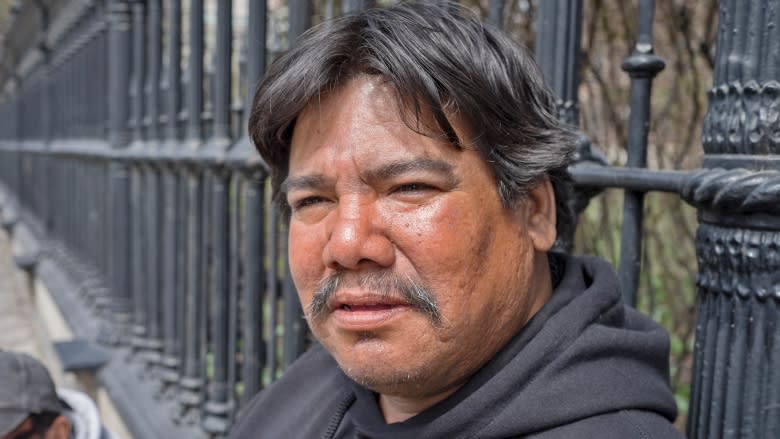Homeless killings, assaults highlight the perils of life on the street
Sometimes it takes a high-profile act of violence against a homeless person to bring the problem back into the minds of those who have become so desensitized to seeing people living on the streets every day, the head of a national advocacy group says.
"We want to always keep these issues front and centre, and it`s unfortunate that sometimes it takes such tragedy ... to really raise awareness of homelessness," says Carolann Barr, executive director at Raising the Roof.
"In a country like Canada, that really should be shocking to us."
Barr's comments came after two men were sentenced to life in prison last week for killing a homeless man in Nova Scotia, Harley Lawrence, by dousing him in gasoline and setting him on fire.
It was one of a spate of recent incidents that highlighted the plight of the estimated 235,000 homeless in Canadian cities.
On the same day a 29-year-old man pleaded guilty to attempted murder following an attack on Marlene Bird, a homeless woman living in Saskatchewan, who was cut and burned so badly that both her lower legs had to be amputated.
A homeless man in Winnipeg was also charged with murder recently in the deaths of three men who had all spent time living on the streets.
Barr said she sometimes hears from people who falsely assume that homeless people are all drugs addicts, or that they just don't want to work.
"Someone who faces homelessness is just like you and me, but they've gone through some struggles and they've come up against some barriers in society, and we really want to promote understanding over judgment and ignorance," she said.
'Anything helps'
Guy Dheilly sits on a corner in Toronto's financial district with a sign that reads: Anything helps. Thank you. God Bless.
The 64-year-old keeps to himself and lives in a shed he rents from a homeowner in another part of the city for $10 a month. The man approached him when he was out on the street and suggested he live in the shed on his property.
- VIDEO: Homeless Canadians brought to tears by the mean things people say about them
He said some people are friendly, but others walk by and pretend that he isn't there.
"They think we're garbage or something, I don't know," he said.
"If they just spent a day in my shoes, it'd change their mind in a hurry."
According to the 2014 State of Homelessness in Canada, there are often a range of factors that lead to a person living without shelter.
"The causes of homelessness reflect an intricate interplay between structural factors (poverty, lack of affordable housing), systems failures (people being discharged from mental health facilities, corrections or child protection services into homelessness) and individual circumstances (family conflict and violence, mental health and addictions)," the report states.
The York University-based Canadian Observatory on Homelessness estimates that about 235,000 people in Canada are homeless annually, including about 20 per cent who live without shelter on a long-term basis. About one-third live with mental health issues, the website for Raising the Roof states.
Stephen Gaetz, a professor at York University and director of the observatory, said creating an environment where homeless people are stigmatized, looked upon and seen as dangerous or undeserving people can help fuel the high levels of violence against homeless people.
"People who are homeless are exponentially more likely to be victims of crimes," he said, including assault, theft and in the case of women, high levels of sexual assault.
"It's not all homeless people on homeless people crime," he said.
A 2011 study based on interviews with 300 homeless people found that 40 per cent said they had been physically assaulted in the previous year, with an average of three incidents per year. One-fifth of the women reported being sexually assaulted.
The numbers were similar to surveys conducted in Ottawa and Hamilton this year where approximately 40 per cent of those surveyed said they had been beaten up or attacked since becoming homeless.
Gaetz said homeless people are at risk for a number of factors.
"When people are homeless, they're often policed into more dangerous areas of town, they're vulnerable because they are often on their own," he said.
He said perpetrators also assume that they are unlikely to go to police to report a theft of their belongings, which tend to be carried with them everywhere they go.
"There are a lot of people who would take advantage of other people," he said.
Don't fully understand
David, a homeless man sitting on a street corner in downtown Toronto, said he has seen people attacked by groups of people who are looking for cash or trying to steal belongings.
"It's usually three or four people beating up on a person," he said.
Originally from Winnipeg, David has spent 15 years on and off in Toronto. He said he has been safe from violence since quitting drinking.
While the average Canadian is certainly aware of homelessness, they often don't fully understand what the experience is really like, said Tim Richter, president and CEO of the Canadian Alliance to End Homelessness.
He said many volunteers say their attitude changes dramatically when they actually get a chance to spend time with people and to hear their individual stories.
"Once we begin to see these folks as people and can understand just the level of injury, illness, trauma they experience, people are pretty compelled to act," Richter said.



